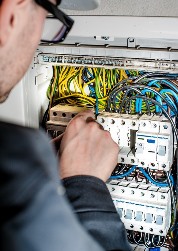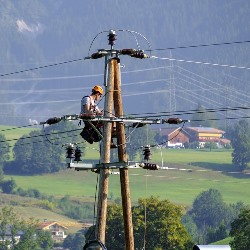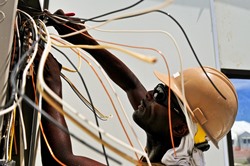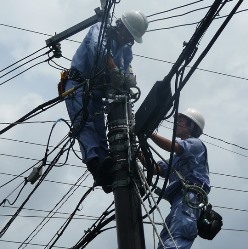How to Select the Best Electrician Training School near Niagara University New York
 The initial step to learning to be an electrical tradesman or contractor is enrolling in an electrician trade school near Niagara University NY. But with numerous technical schools to choose from, just how do you go about making certain that you enroll in the ideal one? Especially since there are so many variables to examine. For example, many prospective students will commence by searching for schools that are close to their residence. Once they have located some that are within driving range, they will decide on the one with the least expensive tuition. While cost and location are of importance, they are not the only factors that need to be considered. Also important are the accreditation and reputations of the schools, along with their job placement and graduation rates. These and additional qualifications should help mold your final judgment when picking an electrician trade school. We will cover that checklist in greater detail later in this article. But first, let’s talk a little bit about becoming an electrician and the training choices that are available.
The initial step to learning to be an electrical tradesman or contractor is enrolling in an electrician trade school near Niagara University NY. But with numerous technical schools to choose from, just how do you go about making certain that you enroll in the ideal one? Especially since there are so many variables to examine. For example, many prospective students will commence by searching for schools that are close to their residence. Once they have located some that are within driving range, they will decide on the one with the least expensive tuition. While cost and location are of importance, they are not the only factors that need to be considered. Also important are the accreditation and reputations of the schools, along with their job placement and graduation rates. These and additional qualifications should help mold your final judgment when picking an electrician trade school. We will cover that checklist in greater detail later in this article. But first, let’s talk a little bit about becoming an electrician and the training choices that are available.
Click Here to Get Free Information on Electrician Schools Near You!
Electrician Certificate, Diploma and Degree Programs
 There are several ways to obtain electrician instruction in a trade or technical school near Niagara University NY. You can select a diploma or certificate program, or obtain an Associate Degree. Bachelor’s Degrees are available at certain schools, but are not as prevalent as the first three alternatives. Frequently these programs are made available combined with an apprenticeship program, which are required by the majority of states in order to be licensed or if you intend to earn certification. Following are brief descriptions of the three most prevalent programs available.
There are several ways to obtain electrician instruction in a trade or technical school near Niagara University NY. You can select a diploma or certificate program, or obtain an Associate Degree. Bachelor’s Degrees are available at certain schools, but are not as prevalent as the first three alternatives. Frequently these programs are made available combined with an apprenticeship program, which are required by the majority of states in order to be licensed or if you intend to earn certification. Following are brief descriptions of the three most prevalent programs available.
- Diploma and Certificate Programs are typically provided by New York trade and technical schools and take approximately a year to finish. They provide a good foundation and are aimed towards individuals who would like to get into an apprenticeship more quickly as a journeyman electrician.
- Associate Degree Programs require two years to complete and are provided by New York community colleges, typically as an Associate Degree in Electrical Technology. They provide a more extensive education while supplying the foundation that readies students to enter into their apprenticeship program.
As previously mentioned, Bachelor’s Degree programs are available at some New York colleges, but are less popular at four years than the other shorter programs. Many states mandate that an apprenticeship of no less than 2 years and more typically four years be carried out before licensing. Because of that, most students are eager to begin their paid apprenticeship, particularly if it’s not a component of their academic program.
Electrician License and Certification Prerequisites
 Electricians in Niagara University NY can undertake a multitude of duties, such as testing, installing and replacing electrical systems, and making sure that the wiring in buildings and homes are up to code standards. After concluding an apprenticeship, journeyman electricians are required to be licensed in most states or municipalities. The length of apprenticeship differs by state, but usually around 4 to 5 years of prior experience is needed in order to take the licensing exam. The exams commonly test general knowledge and electrical theory, as well as knowledge of the National Electrical Code (NEC). Obtaining certification is also an optional means for an electrician to distinguish her or himself as a experienced and skilled professional. The certifications offered differ by state and can be obtained in many specializations, including cable splicing as an example. The certification process usually includes three levels of proficiency:
Electricians in Niagara University NY can undertake a multitude of duties, such as testing, installing and replacing electrical systems, and making sure that the wiring in buildings and homes are up to code standards. After concluding an apprenticeship, journeyman electricians are required to be licensed in most states or municipalities. The length of apprenticeship differs by state, but usually around 4 to 5 years of prior experience is needed in order to take the licensing exam. The exams commonly test general knowledge and electrical theory, as well as knowledge of the National Electrical Code (NEC). Obtaining certification is also an optional means for an electrician to distinguish her or himself as a experienced and skilled professional. The certifications offered differ by state and can be obtained in many specializations, including cable splicing as an example. The certification process usually includes three levels of proficiency:
- An experience requirement
- Passing a written exam
- Passing a practical exam
Examples of certifying organizations include the National Joint Apprenticeship and Training Committee (NJATC) and also the National Institute for Certification in Engineering Technologies (NICET). It’s imperative that the electrician trade school that you choose not only provides a solid educational foundation, but also helps prep you for passing any licensing and certification exams that you might be required to take in the future.
Enrolling in Electrician Online Schools
 An alternative that you might have looked at is enrolling in an electrician online program to earn a degree or a certificate. Even though online schools are becoming more accepted as a way of attending class without needing to travel, in this situation they are not completely internet based. Pretty much all electrician schools require partial attendance on-campus to receive hands-on practical training. But since the balance of the classes can be accessed online, distance learning may be a more accommodating choice for students that have limited time for education. And as an added benefit numerous online degree programs have a reduced tuition cost compared to their traditional competitors. Commuting costs from Niagara University NY are also minimized and a portion of the study materials can be accessed online also. All of these benefits can make electrician online tech schools more economical and accessible. And a number are fully accredited, which we will discuss in our due diligence checklist.
An alternative that you might have looked at is enrolling in an electrician online program to earn a degree or a certificate. Even though online schools are becoming more accepted as a way of attending class without needing to travel, in this situation they are not completely internet based. Pretty much all electrician schools require partial attendance on-campus to receive hands-on practical training. But since the balance of the classes can be accessed online, distance learning may be a more accommodating choice for students that have limited time for education. And as an added benefit numerous online degree programs have a reduced tuition cost compared to their traditional competitors. Commuting costs from Niagara University NY are also minimized and a portion of the study materials can be accessed online also. All of these benefits can make electrician online tech schools more economical and accessible. And a number are fully accredited, which we will discuss in our due diligence checklist.
What to Ask Electrician Technical Schools
 Once you have decided to earn a certificate, diploma or degree, you can begin to focus your training options. Considering that there are numerous electrician tech and trade schools in the Niagara University NY area, it’s imperative to have a checklist of qualifications that each school must meet. The initial 2 that we mentioned were location and tuition expense. If you are interested in earning an degree online, then that must be a feature that your final school offers. And even though all three qualifiers may be important when making your decision, there are additional factors that need to be taken into account as well. Below is a checklist of those added qualifiers that you will need to research prior to enrolling in an electrical technical school.
Once you have decided to earn a certificate, diploma or degree, you can begin to focus your training options. Considering that there are numerous electrician tech and trade schools in the Niagara University NY area, it’s imperative to have a checklist of qualifications that each school must meet. The initial 2 that we mentioned were location and tuition expense. If you are interested in earning an degree online, then that must be a feature that your final school offers. And even though all three qualifiers may be important when making your decision, there are additional factors that need to be taken into account as well. Below is a checklist of those added qualifiers that you will need to research prior to enrolling in an electrical technical school.
Accreditation. A large number of electrician vocational schools have earned either a regional or a national accreditation. They may receive Institutional Accreditation, which involves the school’s programs overall, or Programmatic Accreditation, which pertains to an individual program, for instance electrical technology. Confirm that the Niagara University NY program is accredited by a U.S. Department of Education approved accrediting organization, for example the Accreditation Board for Engineering and Technology. In addition to helping make certain that you get a quality education, it may help in obtaining financial assistance or student loans, which are in many cases unavailable for non-accredited schools. Furthermore, a number of states mandate that the electrician training program be accredited for it to be approved for licensing.
High Completion and Placement Rates. Ask the electrician training programs you are considering what their completion rates are. The completion rate is the percentage of students who enroll in and finish the program. A lower completion rate might indicate that students were dissatisfied with the program and quit. It could also mean that the teachers were not competent to train the students. It’s similarly essential that the schools have high job placement rates. Older and/or more reputable schools may have a more extensive directory of alumni, which can mean more contacts for the school to utilize for their apprenticeship and job placement programs. A high job placement rate will not only validate that the school has an excellent reputation within the trade, but additionally that it has the network of contacts to help Niagara University NY graduates obtain apprenticeships or jobs.
Apprenticeship Programs. Numerous electrician technical programs are taught along with an apprenticeship or an internship program. Those participating vocational and trade schools will help place you in an apprenticeship program within their network of electrician businesses or trade unions. Ask if the schools you are considering have working relationships with Niagara University NY area electricians or electrical companies. An apprenticeship not only provides a valuable experience by supplying hands-on training, but it also furnishes employment opportunities and helps to build relationships in the regional electrician professional community.
Modern Facilities. Make certain that the school facilities and the equipment that you will be trained on are up-to-date and what you will be using on the job. If you are currently in an internship or an apprenticeship, check with the electrical specialist you are working under concerning what you should be expecting. Otherwise, ask a local Niagara University NY electrical contractor if they can provide some suggestions. Also bear in mind that unless you are able to relocate, the school must be within commuting distance of your Niagara University residence. Take note that if you decide to attend an out-of-state school, besides the added moving costs there might be higher tuition fees compared to in-state residents.
Smaller Classes. It’s important that you receive as much personalized training as possible, which can be challenging in bigger classes. Ask if you can monitor some of the classes so that you can observe how big they are and experience the interaction between students and instructors. Speak with several of the students and get their feedback concerning class sizes and instruction. Finally, speak with some of the instructors and find out what their level of experience is and what certifications or degrees they have earned.
Flexible Scheduling. Verify that the class schedules for the schools you are reviewing are flexible enough to fulfill your needs. If you are only able to attend classes at night or on weekends near Niagara University NY, confirm that the schools you are comparing provide those options. If you can only attend part-time, make sure that the school you select allows part-time enrollment. Additionally, find out what the protocol is to make-up classes should you miss any due to work, illness or family responsibilities.
Classes For Electrician Niagara University New York
 Picking the ideal electrical training program will undoubtedly be the most important decision you will make to begin your new career. You originally came to this website due to an interest in Classes For Electrician and wanting more information on the topic Electrician Diploma Online. But as we have discussed in this article, there are several things that you will need to examine and compare between the schools you are reviewing. It’s a must that any electrician tech school that you are considering includes a lot of hands-on instruction. Classes need to be small in size and each student should have their own equipment to train with. Classroom teaching should provide a real-world context, and the curriculum should be up-to-date and in-line with industry standards. Courses vary in length and the type of credential offered, so you will have to ascertain what length of program and certificate or degree will best fulfill your needs. Each training program provides unique possibilities for certification also. Probably the best approach to research your short list of schools is to check out each campus and talk with the students and faculty. Invest some time to attend some classes. Inspect the campus and facilities. Make sure that you are confident that the school you choose is the ideal one for you. With the right training, effort and commitment, the end result will be a new occupation as a professional electrician in Niagara University NY.
Picking the ideal electrical training program will undoubtedly be the most important decision you will make to begin your new career. You originally came to this website due to an interest in Classes For Electrician and wanting more information on the topic Electrician Diploma Online. But as we have discussed in this article, there are several things that you will need to examine and compare between the schools you are reviewing. It’s a must that any electrician tech school that you are considering includes a lot of hands-on instruction. Classes need to be small in size and each student should have their own equipment to train with. Classroom teaching should provide a real-world context, and the curriculum should be up-to-date and in-line with industry standards. Courses vary in length and the type of credential offered, so you will have to ascertain what length of program and certificate or degree will best fulfill your needs. Each training program provides unique possibilities for certification also. Probably the best approach to research your short list of schools is to check out each campus and talk with the students and faculty. Invest some time to attend some classes. Inspect the campus and facilities. Make sure that you are confident that the school you choose is the ideal one for you. With the right training, effort and commitment, the end result will be a new occupation as a professional electrician in Niagara University NY.
More Electric Locations in New York
Niagara Falls, New York
Niagara Falls (/naɪˈæɡərə/ ny-AG-ər-ə) is a city in Niagara County, New York, United States. As of the 2010 census, the city had a total population of 50,193, down from the 55,593 recorded in the 2000 census. It is adjacent to the Niagara River, across from the city of Niagara Falls, Ontario, and named after the famed Niagara Falls which they share. The city is within the Buffalo–Niagara Falls Metropolitan Statistical Area and the Western New York region.
While the city was formerly occupied by Native Americans, Europeans who migrated to the Niagara Falls in the mid-17th century began to open businesses and develop infrastructure. Later in the 18th and 19th centuries, scientists and businessmen began harnessing the power of the Niagara River for electricity and the city began to attract manufacturers and other businesses drawn by the promise of inexpensive hydroelectric power. After the 1960s, however, the city and region witnessed an economic decline, following an attempt at urban renewal under then Mayor Lackey. Consistent with the rest of the Rust Belt as industries left the city, old line affluent families relocated to nearby suburbs and out of town.
Despite the decline in heavy industry, Niagara Falls State Park and the downtown area closest to the falls continue to thrive as a result of tourism. The population, however, has continued to decline from a peak of 102,394 in the 1960s due to the loss of manufacturing jobs in the area.
Business Results 1 - 10 of 37













